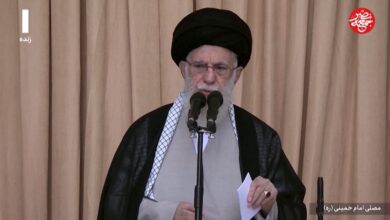At the end of January, the nine countries that contain the Nile River, otherwise known as the Nile Basin countries, will meet in Sharm el-Shiekh for what is supposed to be a final round of negotiations on reaching a long term settlement on the use of the Nile. Mohamed Salman, professor of political science at Cairo University, is an expert on the Nile Basin. Salman explains the international politics of the river.
Al-Masry Al-Youm: What is the Nile Basin Initiative really about?
Mohamed Salman: It’s a framework for cooperation between the Nile Basin countries. It outlines cooperation for capacity building, trust between countries, hydropower, water research and so forth. The good points are that it didn’t focus only on the water issue. It focused on water issues, agricultural issues, hydropower issues and the issue of trust building, for example, between engineers and NGO. The negative points is that it does not address the gap between the rate of development in the Nile Basin countries. In Egypt the per capita is about US$1,200, while the other Nile Basin Countries, the per capita is between $300-500 at most. There’s a difference between Egypt and the other countries.
Al-Masry: What is the conflict between the Nile Basin countries?
Salman: There are three main areas of conflict. The first is over the historical treaties, the second is on how to share water between upstream and downstream countries and the third is the pro-notification condition, or that Egypt and Sudan insist on notification before any projects in upstream countries. The World Bank agrees with Egypt and Sudan’s position, but not all of the countries agree. We can divide these eight countries into two groups. Kenya, Tanzania, Uganda and Ethiopia are what we call "hard-dissatisfied" countries. Rwanda, Burundi, Eritrea and the Democratic Republic of Congo are "soft-dissatisfied" countries. The first four countries reject all three main areas. In the last seven years these countries called for Egypt and Sudan to pay money for water. They have a large amount of water; they don’t need water from the Nile Basin. They are poor countries and they want to play a political game to pressure Egypt and Sudan while having economic gains.
Al-Masry: So they are just playing politics, but if they really wanted to take the water they could?
Salman: They can’t, according to the geographic facts. None of these countries can stop the flow of these water, except in areas of Northern Sudan. These countries can’t build dams to stop the water. The human technology cannot build any dams in this area. They can build some canals or small dams, and for this Egypt does not refuse. If you have a feasibility study and pro-notification and this project will not be harmful, we agree. If you want to make a small dam for electricity, very good.
In the 1960’s when the United States was against Egypt because of the policies of Gamal Abdel Nasser, the United States invited some engineers and technicians from Ethiopia to study 33 projects and the potential to make some projects to harm Egypt and Gamal Abdul Nasser. The final conclusion by the Americans was that the 33 projects would could billions of dollars and would not be very harmful for Egypt. It would only prevent six billion cubic meters of water, so it was nonsense. So the geographic facts favor the downstream countries.
Al-Masry: So why not more technical cooperation when Egypt has so much experience in water projects?
Salman: Egypt has already had some technical cooperation with upstream countries, but in my opinion–and the official water resources policy disagrees with me and doesn’t want me to say–it’s not enough. In comparing with what Israel does in this area and comparing with the pivotal importance strategic, political and economic for Egypt, it is one of the circles of national security for Egypt.
The large importance of Egyptian foreign policy toward the Middle Eastern and Arab countries came at the expense of Africa. Egypt has given great importance to the Arab-Israeli conflict, especially Israel-Palestine, and very low interest for the African continent and especially the area of the Nile Basin.
Al-Masry: What are Israelis activities in the Nile Basin?
Salman: Israel is one of the pragmatic states, working according to real politics. It seeks to fulfill its national interest and protect its national security. So Israel, since the 1960’s and 70’s has had many relations in the political, diplomatic and economic dimensions, as well as technical and military with the whole of the African continent, especially Nile Basin countries.
Israel used soft power. Israel has some projects to participate Egypt and Sudan in the quota of the Nile. There was a project in 1903 presented by Theodore Herzel–and I have the map–to bring the water of the Nile into Israel. They seek to fulfill this project. Of course Egypt refuses. In the 1970’s an engineer named Elisha Kally presented a new project to have 1% of the total amount of the Nile, or about 85 million cubic meters. They wanted to make water against peace. The official Egyptian policy, as well the Egyptian people, refused this.
Elisha Kally presented a plan to have water cross under the Suez Canal. When Israel failed to have any water from Egypt either by war or by peace, it adopted another stategy, what I call the containment policy, like the US had against the USSR to prevent communism to spread.
Al-Masry: What’s the containment policy in Africa? What is Israel’s strategy?
Salman: Israel played an important role by having relations with these countries. What is behind is that Israel pushed these countries to ask for more water. But they don’t want more water. They are asking for money from Egypt and Sudan, this is the political analysis for this game.
But I believe if water goes to Sinai, it will be one of the elements to develop Sinai only. According to principles of international law no international basin country can give water to another country outside of the basin unless all countries agree. Egypt can’t Israel water unless the nine countries agree. Sudan will refuse, while the other countries would agree in exchange for money. But if we sell water to Egypt there will not be one revolution, but several revolutions.
Al-Masry: There is a round of discussions in Sharm el-Shiekh in the end of January between Nile Basin Countries. What will happen?
Salman: Egypt and Sudan made a big mistake in the past in 1959 when they went only together to sign the agreement. They must in this period take all of the countires in the Nile Basin and look for their water requirements and give them some quotas. In the past these quotas were small, so now we pay. Anything that benefits the water resources of the other Nile Basin countries.
But the probability of having a final agreement in Sharm is very small. Egypt has started to move toward win-win cooperation. If we have a common interest between Egypt, Sudan and upstream countries, the external rule will be nonsense. The potential for cooperation will increase.




